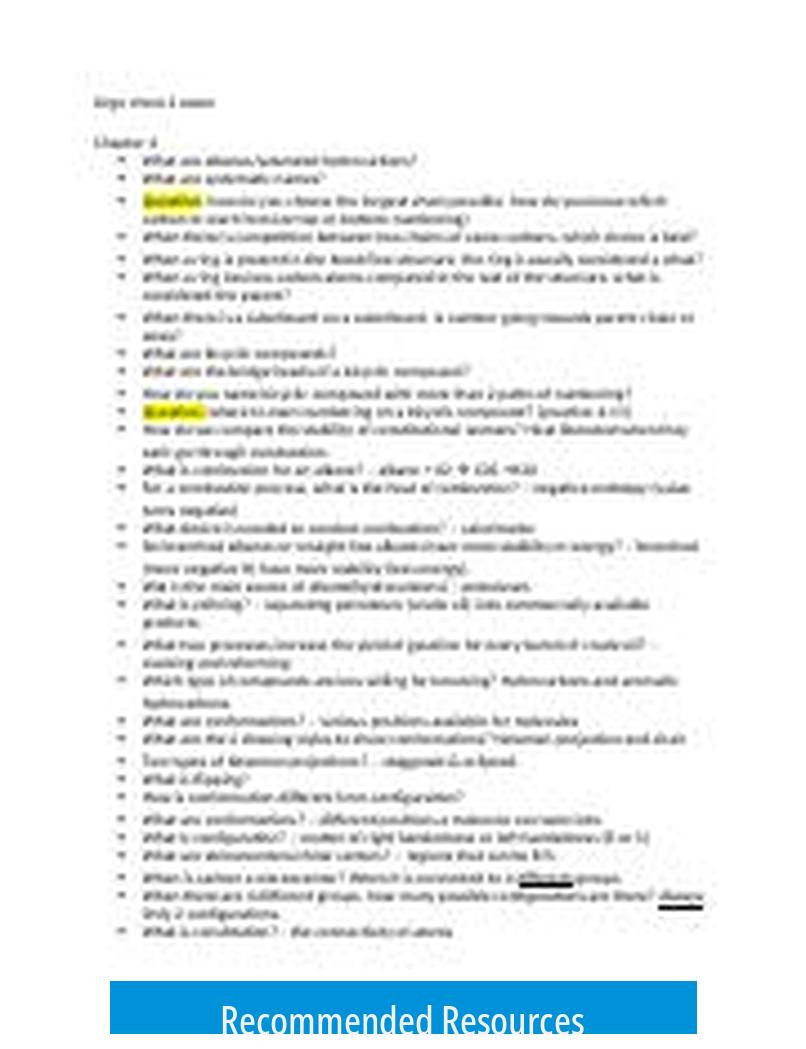How to Ace Organic Chemistry

Acing organic chemistry requires strong conceptual understanding, steady practice, good study habits, and use of reliable resources. This article breaks down proven strategies to succeed, from foundational concepts to exam preparation.
Recommended Resources

Books that Simplify Organic Chemistry

- Organic Chemistry as a Second Language is highly praised for clarifying core principles. It supports both introductory and advanced topics and helps bridge gaps in understanding.
- This book is portable and meant to be a constant companion during study sessions.
- How to Succeed in Organic Chemistry: A Concise Guide is another resource that condenses main points effectively.
Khan Academy

Khan Academy provides extensive free video lectures and exercises. It breaks down complex topics into manageable lessons. Practicing problems on this platform helps reinforce concepts in a practical way.
Practice Problems: The Cornerstone of Mastery
Practice remains vital for acing organic chemistry. Consistent problem-solving trains recognition of reaction patterns and mechanisms.
- Do all assigned practice problems and take additional ones if available.
- Utilize practice exams—these simulate real test conditions and question styles.
- Repetition leads to automaticity; the correct answers should soon feel obvious.
- Consider using empty whiteboards or notebooks solely for working out problems to visualize your thought process.
Attending Lectures and Taking Notes
Class attendance ensures exposure to instructor insights and explanations beyond textbooks.
- Attend all lectures; passive learning rarely suffices.
- Take detailed notes focusing on mechanisms and explanations, not just reactions.
- Pre-read textbook chapters so lectures reinforce rather than introduce material.
- Review notes within 24 hours, ideally devoting 1–2 hours per lecture to consolidate understanding.
Collaborative Study
Study groups create opportunities to clarify doubts and explain concepts aloud, which deepens learning.
- Form groups of 3 to 5 peers who are motivated.
- Discuss challenging topics and quiz each other.
- Seek help from knowledgeable classmates if you lack a group.
- Use your professor’s office hours actively; these sessions clarify difficult ideas.
Conceptual Understanding vs Memorization
Organic chemistry hinges more on concepts than rote memorization.
- Focus on understanding reaction mechanisms: why bonds break and form, and electron movements.
- Base your reasoning on acid-base chemistry, resonance structures, and molecular orbital theory.
- Memorizing reagents helps but is insufficient without grasping the underlying logic.
- Learn principles of electrophiles and nucleophiles, steric effects, and stability versus kinetic control.
- Predicting arrow-pushing in mechanisms simplifies complex reactions.
- Generalize patterns rather than memorizing discrete reactions to reduce cognitive load.
Strategic Study Habits
Efficient study habits save time and improve retention.
- Read material ahead of lectures; this allows you to ask better questions during class.
- Keep a dedicated notebook for synthesis problems and reaction pathways; organizing information visually improves recall.
- Limit study sessions to focused, manageable blocks (about 2 hours per lecture content).
- Avoid cramming by studying consistently over the semester.
- Prioritize sleep especially before lectures to maximize cognitive performance.
Active Learning and Critical Thinking
Engage deeply with material by asking why reactions occur and what drives selectivity.
- Question the role of solvents, catalysts, and electronic effects to understand real-world conditions.
- Test yourself frequently to identify weak spots early.
- Use office hours not only for answers but for gaining insight into problem-solving strategies.
Transition from Organic Chemistry I to II
Focus Shift: Concepts to Memorization
Organic Chemistry I emphasizes fundamental mechanisms and principles. Organic Chemistry II builds heavily on this base but involves memorizing more reactions and reagents.
Importance of Strong Foundations
- Success in Organic II depends on mastery of Organic I topics.
- Review earlier material before advancing to maintain continuity.
Diligence and Organization
Organic II demands systematic study:
- Track numerous reactions, their conditions, and outcomes carefully.
- Study daily to keep content manageable.
- Connect various reactions to understand multi-step synthetic sequences.
Growth Opportunity
Organic Chemistry II can be the chance to improve your grade and deepen understanding. Many students who find Organic I difficult perform better with disciplined study habits in Organic II.
Summary of Key Strategies
- Use trusted resources: “Organic Chemistry as a Second Language,” Khan Academy, and practice exams.
- Practice extensively: Do as many problems as you can and work on practice exams.
- Attend lectures: Take detailed notes and review material regularly.
- Form study groups: Collaborate and utilize office hours.
- Understand mechanisms: Focus on why electrons move and reactions occur rather than pure memorization.
- Develop good study habits: Read ahead, organize notes, and maintain consistent study schedules.
- Engage actively: Ask questions, test understanding, and think critically about each reaction.
- Prepare for Organic II: Master fundamentals and stay organized to handle the increased memorization demands.
HOW THE F DO YOU ACE ORGO?!
To ace Organic Chemistry (aka ORGO), you need a mix of smart resources, relentless practice, active learning, and a deeper understanding of mechanisms rather than just memorizing reactions. It’s not just about cramming molecules into your brain. It’s about seeing the *why* behind every arrow push, every electron move, and every reaction step.
Sounds simple, right? Spoiler: it’s not. But there’s a proven way to *actually* master Orgo without losing your sanity.
The Secret Sauce: Start With the Right Resources
If you’re serious about conquering Orgo, first thing’s first: grab Organic Chemistry as a Second Language. This book is like your friendly sidekick, breaking down complex ideas so you actually get them. Many students swear it’s the *only* reason they survived.
It’s small enough to carry everywhere, so pull it out anytime you have a minute. Waiting in line? Open it. On the bus? Crack it open. This consistency adds up.
Also, don’t sleep on Khan Academy. Their videos simplify things so well it feels like a buddy explaining it at a coffee shop. They include tons of practice problems, which you absolutely can’t skip. Practice is Orgo’s magic ingredient.
Practice Problems: Your Best Frenemy
Here’s a truth bomb: you don’t just study Orgo, you drill it. Do practice problems until the answers become boringly obvious. Don’t just do one or two sets; do enough to confidently say, “Hey, I got this reaction mechanism down.”
If your professor hands out practice exams, treat those like your ticket to the major leagues. They’re usually the closest experience you get to the real test.
Some students even find an empty lecture hall and fill every whiteboard with scribbled problems. It’s a bit extra, but hey, desperate times call for desperate measures!
Attend Lectures and Take Notes Like a Pro
Showing up matters. It’s tempting to skip that 8 a.m. Orgo lecture after a late night, but it’s a trap. You miss details that no textbook will spell out clearly.
Take detailed notes during class—don’t just scribble or type blindly. Review those notes within 4 hours after class to cement ideas in your brain. Staying on top of material keeps you from cramming later. Just two hours of focused review per lecture can save you from weeks of panic.
Also, read ahead. Yes, you might hate it, but it makes lectures feel like a review instead of brand-new content. It lets you ask smarter questions and stay ahead of the curve.
Study Groups: Because Orgo Wasn’t Meant to Be Solo
Find 3 other people (or fewer if that’s your vibe) and form a study group. Why? Because talking through problems with others helps your brain process things in new ways. No friends? No problem—ask someone in class. Organic Chemistry office hours exist for a reason, so use them! Professors actually want to help, even if they sometimes seem like molecule-spouting wizards.
Understanding vs Memorizing: The Golden Rule
This cannot be overstated: understand why things happen, don’t just memorize them. Reagents and products can be memorized, but if you nail the mechanisms, you’re golden.
Think about electron flow like a detective solving a mystery. Electrons are always looking to move from a high-energy, electron-rich spot to a low-energy, electron-poor spot. If you learn where the active electrons are and why they attack specific spots, you’ll decode new reactions on the fly.
When you learn a reaction, always write out the mechanism steps. Don’t skip this, even for “easy” oxidations or reductions. The arrows tell the story, and if you know the story, you ace the test.
Master acid-base concepts, resonance structures, and molecular orbitals. These foundational ideas pull together all the seemingly random reactions into a sensible framework.
Study Habits: Organize and Query
Consistency beats cramming—study a bit daily. A good trick is to make a separate notebook just for syntheses. Professors say this can be the difference of an entire letter grade. Seeing multi-step transformations in one place helps you connect dots like a pro.
When you learn something new, ask yourself: Why did this happen? What’s driving this reaction? This habit changes passive reading into active learning, and it pays off big time.
Orgo I vs Orgo II: What You Need to Know
Orgo I is all about concepts. It’s the foundation. You focus on understanding reactions and mechanisms rather than memorizing lots of stuff. Orgo II flips that script somewhat and demands more memorization. It builds heavily on your Orgo I knowledge. If you’re rusty, refresh yourself before tackling Orgo II.
Orgo II also requires being highly organized and diligent. You’ll juggle many reactions, reagents, and mechanisms. Study disciplined little by little and keep your notes in check.
Connecting reactions is a lifesaver. Think of it like a puzzle; understanding how one reaction transitions to another makes multi-step problems on exams more manageable.
Can You Bounce Back If Orgo I Was a Disaster?
Absolutely! Orgo II is your chance to soar. Many struggle in Orgo I. You’re not alone. With better study habits, understanding, and organization, you can drastically improve your grade.
The key is to start early, get solid resources, and actively engage with material.
Final Tip: Keep Your Sanity
Organic Chemistry is tough but it’s not impossible. It doesn’t require you to be a genius, just disciplined and strategic. Carry around trusted resources, hammer out practice problems, attend lectures, and question everything.
Ask yourself: what electron is unhappy, where does it want to go, and what product will result fastest versus what forms most stable? This mindset will help you untangle even the most tangled synthetic routes.
Summary: How to Ace Orgo
- Use Organic Chemistry as a Second Language and Khan Academy to build solid foundations.
- Do *tons* of practice problems until they feel redundant.
- Attend every lecture, take detailed notes, and review regularly.
- Form study groups and use office hours actively.
- Focus on understanding mechanisms, not just memorizing reactions.
- Learn electron flow, stability, and reaction principles deeply.
- Read ahead so lectures feel like review.
- Stay organized, especially with complex syntheses.
- Connect reactions mentally for multi-step problem mastery.
- Remember: Orgo II builds on Orgo I. Refresh as needed and study daily.
So next time you ask yourself, “How the F do I ace Orgo?”, just remember it’s a marathon, not a sprint. Equip yourself well, practice smart, and most importantly, understand what’s going on inside those molecules. Your A awaits.
How important is doing practice problems for acing Orgo?
Practice problems are essential. Doing many problems helps you see patterns and understand concepts deeply. Practice until answers feel natural but avoid overdoing it or burning out.
Should I focus more on memorizing reactions or understanding mechanisms?
Understanding mechanisms is key. Know why electrons move and how bonds form or break. Memorization helps, but comprehension lets you predict reactions, which is crucial for exams.
How can study groups improve my Orgo performance?
Study groups expose you to different viewpoints and explanations. Collaborating helps clarify tough concepts. Use office hours with your professor to ask specific questions you encounter.
What is the best way to organize my study time for Orgo lectures?
Read material before class, attend every lecture, and take detailed notes. Spend up to 2 hours reviewing notes after class to solidify understanding. Consistency beats cramming.
How does Orgo II differ from Orgo I in terms of study approach?
Orgo II demands more memorization and discipline. It builds on Orgo I knowledge, so reviewing basics is crucial. Connect reactions and practice multi-step problems to excel in Orgo II.





Leave a Comment